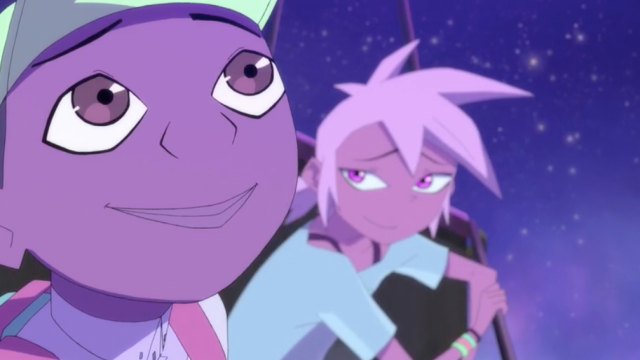Dreamworks’ Kipo and the Age of Wonderbeasts is all about a group of (mostly) average kids making their way around a strange post-apocalyptic land. It’s been overrun with mutated, sentient animals who’ve driven most of humanity to live in hiding underground. On any given day, chances are good that you could run into a massive rabbit monster capable of destroying cities or a talking mandrill flying through the sky atop the back of a two-headed flamingo.
For Kipo and her friends Wolf, Benson, Dave, and Mandu, those types of fantastical things are normal parts of everyday life that influence the way they move through and understand the world. But it’s in Kipo’s quiet, more intimate moments that the show really demonstrates how wonderful its idea of “normal” really is.
When Kipo’s forced to venture out into the wild on her own to find her family, the experience excites her because of her natural inclination toward exploration and discovery. But because many of the surface world’s creatures are all too ready to eat her, it’s only because she befriends Wolf and Benson that she’s able to survive.
Wolf, a girl raised by elitist, predatory wolves, brings invaluable hunting and survival skills to the group, while Benson, a polite dork of a child, brings his knowledge about safe areas that exist topside. Also, there’s his buddy Dave, a loudmouthed bug with a rapid (and seemingly infinite) cycle of metamorphosis that takes him from infancy to old age over the course of every episode. Under any other circumstances, it’s unlikely the three kids would have ever ended up becoming friends, but together, they make an excellent team and develop a genuine love for one another.
Because Benson acts mostly as a source of comic relief, the bulk of Kipo’s stories focus on either Kipo herself or Wolf getting into one kind of harrowing situation or another before the entire group rallies in order to make sure that they all get out safe. Benson isn’t the show’s most action-oriented character, which means that some of his development takes a little bit longer to come into focus, but in “Ratland,” he very casually establishes something about himself that’s equal parts surprising and delightful.
While most of the land on the surface is controlled by various groups constantly battling for control over territory, Benson explains that the Ratland theme park (imagine if the fairground from Charlotte’s Web was run by a pair of giant Templetons) is considered a neutral zone where everyone can relax for a bit and have some fun. As it just so happens to be Kipo’s birthday, bringing her to Ratland is Benson’s gift to her because the theme park is one of his favourite places in the world and he wants to share it.
Up until this point in the series, Kipo’s wholly too busy trying to stay alive and find her people to be concerned with any sort of romantic entanglements. But when Benson explains the thinking behind his gift, she can’t help but wonder if their friendship might grow into something more, and as the pair are sitting at the top of a ferris wheel gazing at the stars, she shoots her shot and tells Benson she thinks she might have a crush on him. The moment’s sweet and nerve-wracking, and Benson totally understands where Kipo’s coming from. The only thing is that Benson likes Kipo as a friend—because he’s gay.
Kipo doesn’t see Benson’s coming out as some sort of major turning point for their friendship, in the way that sometimes tends to be the case when a character reveals their queerness to someone who misinterpreted their platonic signals as signs that romance was in the air. Kipo’s mildly embarrassed, sure, but it takes basically no time for her to get on Benson’s page and express that she’s still happy they’re friends before the pair are suddenly attacked by one of the double flamingos.
What really impressive about Kipo’s depiction of Benson, though, is that the show doesn’t treat his queerness as something that only exists in order to complicate Kipo’s feelings for him.
Queer representation in television series—particularly series aimed at younger audiences—sometimes suffers when storytellers settle on the idea that one single, major coming out moment/episode followed by no references to a character’s queerness still comes across as heartfelt. But Kipo avoids this by adding very specific details—big and small—in its depiction of Benson as the series continues that are worth noting.
In “Mulholland” the group accidentally becomes the unwitting prey of a sentient swarm of tardigrades that traps people in their ideal fantasies while the water bear converts their bodies into consumable energy.
Kipo dreams of being reunited with her family, Wolf dreams of living in the wilderness with Kipo and hunting wonderbeasts, and Benson…Benson dreams about being the sort of popular kid who could throw pool parties attended by nothing but age-appropriate boys. “Mulholland” doesn’t make a big deal about the dream, but it does present it with a distinct matter-of-factness that conveys how perfectly average (if silly) a dream it is for a gay teenager to have.
Kipo and the Age of Wonderbeasts’ queerness isn’t comparable to something like Steven Universe’s, which is to say that the show’s queerness isn’t central to the story being told. But that’s not to say that what the series is doing is in any way less worthwhile—because queer people come in a variety of different forms, and the media representing them should as well.
